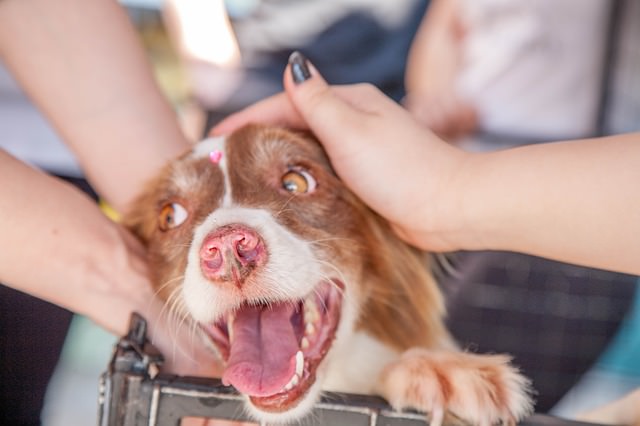Got a puppy? Wonder just when he is going to stop growing? It’s a common question that veterinarians receive. When people adopt dogs from shelters and rescues as puppies, they usually do not know what breeds make up the dog. (the fact is, no one can guess with good accuracy either, see Think You Know A Pit Bull When You See it, So Did We….) People like to plan and even though it usually doesn’t matter because they already love the puppy so much that they will accommodate whatever size he becomes, their curiosity always makes them ask.

Growth and Maturity are not as simple as they may seem. To answer the questions accurately, we have to look at maturity in 3 different arenas:
1. Dental maturity, when all of the adult teeth have erupted completely in the jaws
2. Skeletal maturity, when the dog’s skeleton is the size it will be permanently
3. Sexual maturity, when the dog would successfully be able to mate.
Studies show that there are breed specific differences in the age of maturity of these three1. Dental maturity has been correlated with breeds and body size. Dogs with ancestral (or wolf-like) mouth conformation, like the German Shepherd, seem to closely resemble the wolf in that their dental maturity ranges from 6-7 months of age.1
There is a published dental maturity range of 5.4-8.4 months of age, according to a study done on Bull Terriers.2 It is probably safe to assume that in a normal pet dog, dental maturity has taken place by the age of 8.4 months. This means that your 9 month old pup will have all of his permanent teeth erupted and you should definitely be beginning your at-home dental care training by this age.

Dog owners are probably referring to the age when their young dog is his adult height when they ask this question. They may be considering the size of their home and how it will accommodate their ever growing young canine. Typical dog breeds will usually have attained their full height by the age of 10-11 months, but if your pup is a chondrodystrophic breed, like a Dachshund or a Bassett Hound, he will reach skeletal maturity a little earlier (8-9 months). This effect is believed to be due to the congenital cartilage disturbance and negative effect on the growth of bone.1 Skeletal maturity may also be correlated with breed, nutritional content, the age of neutering, and relative limb size.
The last type of maturity is also important because of its impact on overpopulation and when to alter the pet dog. Because of the typical order that these phases of maturation occur in domestic dogs, it is not likely that any dog would attain sexual maturation before dental maturation, so if your dog still has his baby teeth, he still has a little more growing to do.

Be sure that you use this knowledge to start taking care of his teeth by 8.4 months of age because they are the ones he will keep. Once her adult teeth are in, she is soon to become sexually mature, although because of the impact that the sex hormones have on skeletal growth, you might consider delaying alteration until skeletal maturity at 10-11 months. Consider this delay only if you are sure that you can prevent unwanted breeding, however. By the age of 11 months for domestic dogs, you should be safe to buy that expensive new dog bed and not fear outgrowing it!
Do you love learning about dogs? I love sharing about them! Find me on Facebook by clicking here.
- Geiger M, Gendron K, Willmitzer F, Sánchez-Villagra MR.Unaltered sequence of dental, skeletal, and sexual maturity in domestic dogs compared to the wolf.Zoological Lett. 2016 Aug 22;2(1):16. doi: 10.1186/s40851-016-0055-2. eCollection 2016. PubMed PMID: 27555921; PubMed Central PMCID: PMC4994403.
- Arnall L. Some Aspects of Dental Development in the Dog—II. Eruption and Extrusion.J Small Anim Pract.1960;1:259–67. doi: 10.1111/j.1748-5827.1960.tb06100.x.
 Toledo, United States.
Toledo, United States.